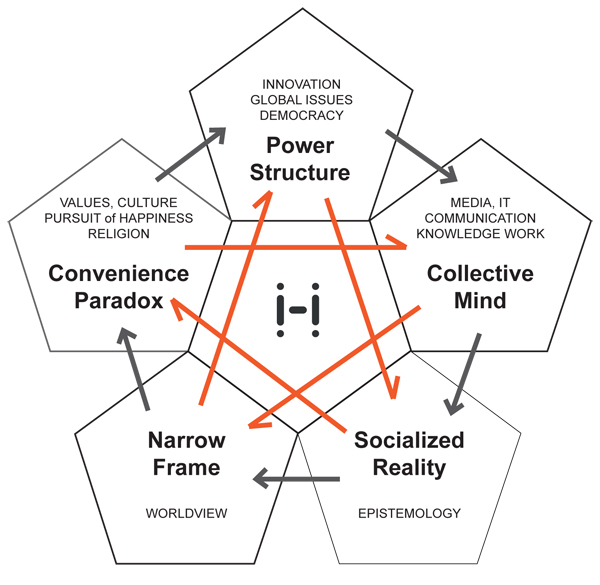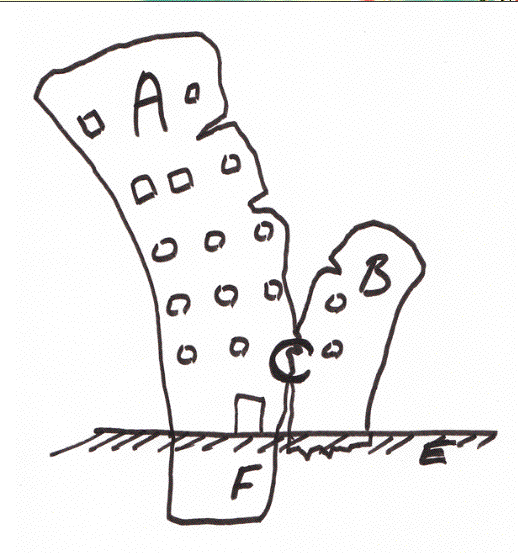Difference between revisions of "Holotopia: Five insights"
m |
m |
||
| Line 14: | Line 14: | ||
<div class="col-md-7"> | <div class="col-md-7"> | ||
<blockquote> | <blockquote> | ||
| − | + | Powered by ingenuity of innovation, the Industrial Revolution improved the efficiency of human work beyond bounds. Where could the next revolution of this kind be coming from? | |
</blockquote> | </blockquote> | ||
| − | |||
</div> </div> | </div> </div> | ||
| Line 25: | Line 24: | ||
<div class="col-md-7"> | <div class="col-md-7"> | ||
<blockquote> | <blockquote> | ||
| − | The printing press revolutionized communication, and enabled the Enlightenment. But | + | The printing press revolutionized communication, and enabled the Enlightenment. But the advent of the Internet and the interactive digital new media constitute a similar revolution. Doesn't this mean that the change we are proposing, from 'the candle' to 'the lightbulb', has already been completed? |
</blockquote> | </blockquote> | ||
| − | |||
</div> </div> | </div> </div> | ||
| Line 35: | Line 33: | ||
<div class="col-md-7"> | <div class="col-md-7"> | ||
<blockquote> | <blockquote> | ||
| − | The Enlightenment was | + | The Enlightenment was before all a change of <em>epistemology</em>. An ancient praxis was revived, by which the human reason was empowered to develop <em>knowledge of knowledge</em>—and on that as foundation, a completely <em>new</em> worldview. <em>This</em> led to "a great cultural revival", and to <em>comprehensive</em> change. On what grounds could a similar change begin today? |
</blockquote> | </blockquote> | ||
| − | + | ||
</div> </div> | </div> </div> | ||
| Line 43: | Line 41: | ||
<div class="col-md-3"><h2>[[Holotopia:Narrow frame|Narrow frame]]</h2></div> | <div class="col-md-3"><h2>[[Holotopia:Narrow frame|Narrow frame]]</h2></div> | ||
<div class="col-md-7"> | <div class="col-md-7"> | ||
| − | <blockquote>Science | + | <blockquote>Science gave us a completely new way to look at the world, and understand it. This gave us powers that the people in Galilei's time couldn't dream of. What might lead to the <em>next</em> revolution of this kind? |
</blockquote> | </blockquote> | ||
| − | |||
| − | |||
| − | |||
</div> </div> | </div> </div> | ||
| Line 55: | Line 50: | ||
<div class="col-md-7"> | <div class="col-md-7"> | ||
<blockquote> | <blockquote> | ||
| − | The Renaissance liberated our ancestors from preoccupation with the afterlife, and empowered them to seek happiness here and now. The lifestyle changed, and the culture blossomed. | + | The Renaissance liberated our ancestors from preoccupation with the afterlife, and empowered them to seek happiness here and now. The lifestyle changed, and the culture blossomed. On what grounds could the <em>next</em> "great cultural revival" be developed? |
</blockquote> | </blockquote> | ||
| − | |||
| − | |||
| − | |||
| − | |||
| − | |||
</div> </div> | </div> </div> | ||
| Line 75: | Line 65: | ||
<p>Follow the black arrows in the Five Insights <em>ideogram</em>, to see that the anomalies they connect together cause or <em>create</em> one another: | <p>Follow the black arrows in the Five Insights <em>ideogram</em>, to see that the anomalies they connect together cause or <em>create</em> one another: | ||
<ul> | <ul> | ||
| − | <li>It is the <em>power structure</em> that created | + | <li>It is the <em>power structure</em> that created dysfunctional communication</li> |
<li>It is the lack of communication that keeps us in <em>socialized reality</em></li> | <li>It is the lack of communication that keeps us in <em>socialized reality</em></li> | ||
<li>It is by founding knowledge in "reality" that we ended up with the <em>narrow frame</em></li> | <li>It is by founding knowledge in "reality" that we ended up with the <em>narrow frame</em></li> | ||
<li>It is by using the <em>narrow frame</em> that we mistook <em>convenience</em> for happiness</li> | <li>It is by using the <em>narrow frame</em> that we mistook <em>convenience</em> for happiness</li> | ||
| − | <li>It is our pursuit of | + | <li>It is our pursuit of convenience that makes us create <em>power structures</em></li> |
</ul> | </ul> | ||
</p> | </p> | ||
| Line 86: | Line 76: | ||
<p>Follow the red arrows to see that we cannot really change one of the insights they connect, without also changing the other.</p> | <p>Follow the red arrows to see that we cannot really change one of the insights they connect, without also changing the other.</p> | ||
<ul> | <ul> | ||
| − | <li>To stand up to the <em>power structures</em>, we must liberate ourselves from the <em>socialized reality</em> | + | <li>To stand up to the <em>power structures</em>, we must liberate ourselves from the <em>socialized reality</em></li> |
| − | <li>Our <em>collective mind</em> cannot <em>federate</em> knowledge, unless we have a | + | <li>Our <em>collective mind</em> cannot be structured to <em>federate</em> knowledge, unless we have a method for doing that</li> |
| − | <li> | + | <li>To liberate ourselves from <em>socialized reality</em>, our values need to be different</li> |
| − | <li>To step beyond | + | <li>To broaden the <em>narrow frame</em>, we must see and unravel the <em>power structure</em> that keeps it in place</li> |
| + | <li>To step beyond <em>convenience</em>, we need a <em>collective mind</em> that federates knowledge</li> | ||
</ul> | </ul> | ||
</div> </div> | </div> </div> | ||
Revision as of 22:40, 31 May 2020
Contents
H O L O T O P I A P R O T O T Y P E
Five Insights
Powered by ingenuity of innovation, the Industrial Revolution improved the efficiency of human work beyond bounds. Where could the next revolution of this kind be coming from?
The printing press revolutionized communication, and enabled the Enlightenment. But the advent of the Internet and the interactive digital new media constitute a similar revolution. Doesn't this mean that the change we are proposing, from 'the candle' to 'the lightbulb', has already been completed?
The Enlightenment was before all a change of epistemology. An ancient praxis was revived, by which the human reason was empowered to develop knowledge of knowledge—and on that as foundation, a completely new worldview. This led to "a great cultural revival", and to comprehensive change. On what grounds could a similar change begin today?
Science gave us a completely new way to look at the world, and understand it. This gave us powers that the people in Galilei's time couldn't dream of. What might lead to the next revolution of this kind?
The Renaissance liberated our ancestors from preoccupation with the afterlife, and empowered them to seek happiness here and now. The lifestyle changed, and the culture blossomed. On what grounds could the next "great cultural revival" be developed?
Sixth insight
The five insights form a whole
The black arrows point to a vicious cycle
Follow the black arrows in the Five Insights ideogram, to see that the anomalies they connect together cause or create one another:
- It is the power structure that created dysfunctional communication
- It is the lack of communication that keeps us in socialized reality
- It is by founding knowledge in "reality" that we ended up with the narrow frame
- It is by using the narrow frame that we mistook convenience for happiness
- It is our pursuit of convenience that makes us create power structures
The red arrows point to a benign cycle
Follow the red arrows to see that we cannot really change one of the insights they connect, without also changing the other.
- To stand up to the power structures, we must liberate ourselves from the socialized reality
- Our collective mind cannot be structured to federate knowledge, unless we have a method for doing that
- To liberate ourselves from socialized reality, our values need to be different
- To broaden the narrow frame, we must see and unravel the power structure that keeps it in place
- To step beyond convenience, we need a collective mind that federates knowledge
The holotopia strategy follows
We can now see why
The strategy that defines the holotopia naturally follows: Instead of struggling with any of the details, we focus on changing the order of things as a whole.a comprehensive change can be easy, even when smaller and obviously necessary changes may have proven impossible.
This more informed and more effective strategy has "leverage points" through which it is most easily pursued—exactly as the bus with candle headlights might suggest.
What is really going on
One of our prototypes is a book manuscript titled "What's Going On?", and subtitle "A Cultural Revival". The book redefines what constitutes the news—by pointing to a breathtakingly spectacular event taking place in our own time. Slowly!
By knowing what's going on in this way, we know what needs to be done. The "problems" we are experiencing are like cracks in the walls of a house whose foundations are failing. Our situation calls for rebuilding, not fixing.


